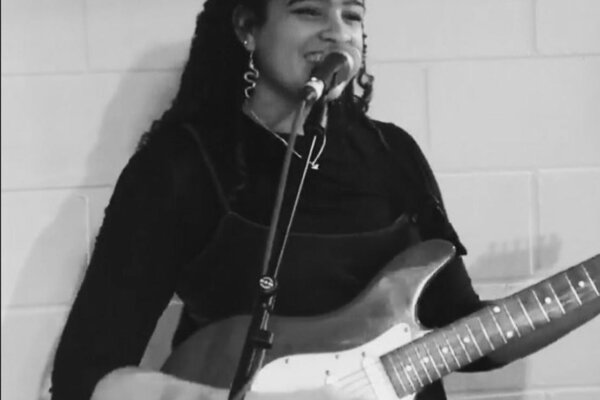Listen
Listen

At this point, we have surely all noted that a lot of current music holds its roots in black music. In celebration of Black History Month, we wanted to look at the implications of this and origins of popular music. I caught up with Sara, a third year Popular Music student from Norwich, to get her thoughts on BHM and who she recommends you check out!
I study music because I love discussing social politics behind popular music genres. Like arguing about what type of jazz is definitely the best type of jazz! It is super exciting to see a resurgence of early black musics now being brought back into the foreground. There’s a reason that black music is so popular in modern music scenes and it’s because it BLOODY SLAPS.
Sara Chilenge
Ye (formally known as Kanye West) shared a Twitter post last year, which was typically sensationalist (calling himself the new Moses) but rang true. Echoing a similar statement to the late, great artist and icon Prince, who advised young artists to avoid signing contracts for fear of “slavery.” He compared the music industry to, “modern day slave ships,” raising a point that resonated with many celebrities and music lovers alike. Modern music owes a lot to black influences and artists, yet they remain largely uncredited.
I need to see everybody’s contracts at Universal and Sony
— ye (@kanyewest) September 15, 2020
I’m not gonna watch my people be enslaved
I’m putting my life on the line for my people
The music industry and the NBA are modern day slave ships
I’m the new Moses
Sara explained, black music has been a pioneering genre since the very early 20th century. Mainstream music has seen the influence of this, in the form of “urban” music such as hip-hop, R&B and reggae. While the term urban has long been synonymous with black music, it has been heavily criticised for being used as a generic term for synonymous with black culture.
Tyler the Creator commented, following his Grammy win, that it was, “Just a politically correct way to say the N-word.” Kenya Barris’ show Black-ish regularly tackles hard issues surrounding politics, society and race. It’s lead character Andre Johnson is promoted to SVP of Urban Division, which he credits to being the only black man on the advertising team, now in charge of any advertisements targeting a black market. Since then, there have been moves to take the term out of the industry.
Sara described why BHM is important for her and empowering for black people. Saying Black History Month is a “funky, crazy, cool time for black people”.
We get to, if only for a month, have a time where we not only celebrate but get to explore our own culture. With black representation in modern media being iffy as it is, it’s nice to have a time where everywhere you look, black artists, black musicians, black poets, and to put it simply, black people are not only present in the public eye, but dominating it.
Sara Chilenge
As the Diversity Secretary for Book Society, Sara has curated suggestions for books which celebrate black culture and encourages people to do the same with their music.
Black History Month is a great time to find new artists that otherwise would have flown under your radar. Now black music is making a return, in the form of neojazz, soul fusions and blues inspired rap.
Sara Chilenge
Her top black artists to check out this Black History Month are:

Queen Latifah
Kamasi Washington
PJ Morton
Bessie Smith
KIRBY
Photo courtesy of Sara Chilenge
Alternatively, you can check out my recommendation, which is Sara herself!